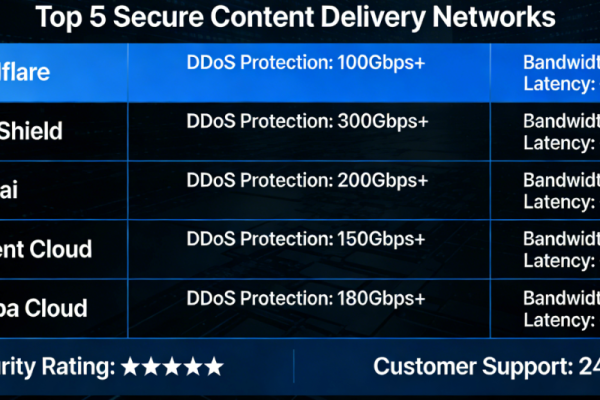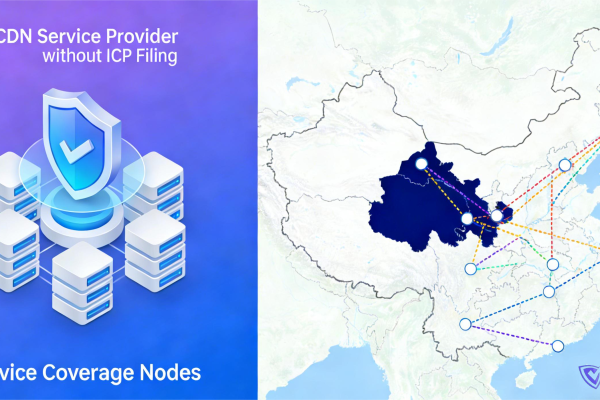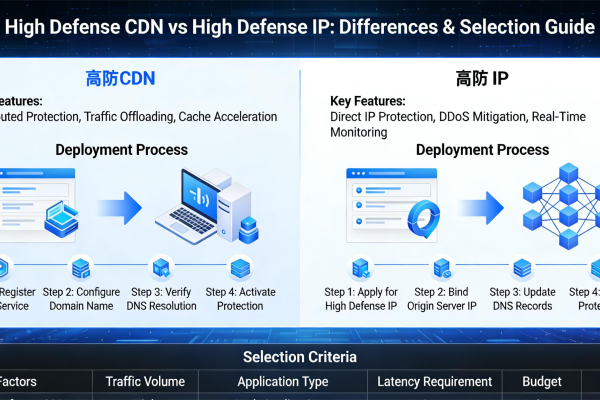Which is the Best Domestic High-Anti-DDoS CDN in China? A Guide to Recommended High-Efficiency Protection Services
Worried about falling into pitfalls when choosing a domestic high-anti-DDoS CDN in China? This article clearly explains how to avoid the "blackhole trap" (a scenario where your server IP is blocked to protect the provider’s own network). It covers key aspects including node coverage, intelligent traffic cleaning, access speed, and a comparison of advantages and disadvantages between major vendors

Recently, I helped a friend in China fix his shabby e-commerce website. Man, as soon as his business started to pick up, it got hit hard by DDoS attacks—so bad that the pages couldn’t even load, and orders plummeted sharply.
Does this scenario feel super familiar? In China’s online environment, running a business without reliable high-anti-DDoS CDN protection is basically like rushing into battle naked. You never know when you’ll get taken down.
You don’t make a penny; you just end up “working for” those attack groups for free.
There are tons of CDN vendors on the market boasting about their “top-tier anti-DDoS capabilities.” Their ads are everywhere, claiming things like “T-level protection,” “self-developed traffic cleaning,” and “100% no downtime”… All of it sounds pretty impressive at first.
But anyone who’s fallen into their traps knows—there’s a lot of fluff here.
Some claim to be “high-anti-DDoS,” but when a real large-traffic attack hits, they either shut down completely or hit you with a “blackhole” (meaning they directly block your server IP to protect their own network). Your business still crashes, and if you try to argue with customer service? They pull out the fine print in the contract, and you’re left with no way to fight back.
Choosing a high-anti-DDoS CDN is like hiring a bodyguard. Being “big” isn’t enough—you need to check their actual skills and response speed.
First, you need to verify if their protection capabilities are genuine. Don’t just listen to sales reps bragging about “hundreds of Gbps” or “several Tbps” of protection—that stuff is mostly empty talk. The key points are: where their traffic cleaning center nodes are located, how wide their coverage is, and most importantly, for China’s complex network environment, whether they fully cover and optimize lines like China Telecom, China Unicom, China Mobile, and China Education and Research Network (CERNET).
You also need to check if their cleaning capability is truly “intelligent”—can it quickly identify malicious traffic? Especially those annoying CC attacks that mimic normal user requests.
Giants like Alibaba Cloud and Tencent Cloud have lots of nodes and solid bandwidth resources, so they can indeed withstand large-traffic attacks. But when it comes to price? Well, you know how that goes. Plus, their rule configurations can be complicated—small teams often struggle to handle them.
Latency and access speed are non-negotiable. If you use a high-anti-DDoS CDN but normal users end up waiting ages for pages to load (like a snail crawling) or images/videos take forever to buffer, it’s better to not use one at all. A good high-anti-DDoS CDN should withstand attacks and, through intelligent routing, direct normal users to the fastest paths—keeping access speed lightning-fast.
In this aspect, established CDN vendors like Wangsu and Baishan Cloud (renamed “Data Security Era” now, I think?) really know their stuff when it comes to node optimization and transmission efficiency. After all, they’ve been in this industry for years and have a strong network foundation.
But you still need to check the specific packages—don’t just go for the cheapest “basic version” to save money.
Then there’s customer service—it can be a lifesaver when things go wrong. When your server is attacked and your website crashes, every minute means lost money and fading user trust. At that moment, will customer service reply instantly, or will your message disappear into a black hole?

Can they quickly locate the problem and adjust strategies, or will they only tell you to “please be patient”? I had the worst experience once: my server got attacked in the middle of the night, and I contacted a second-tier vendor’s customer service. It took nearly two hours to get a human response—by then, it was already too late!
So, 24/7 professional security team support, response speed, and problem-solving ability are absolute must-haves.
Vendors like Zhida Chuangyu’s Jiasule (now called Chuangyu Shield, right?) and Anquanbao (later acquired and integrated by Baidu) had a great reputation in the past—they were well-known for their fast security responses.
Of course, you also need to weigh price and flexibility.
Major vendors are reliable, but they have high price thresholds and rigid rules. Smaller and medium-sized vendors may offer flexible pricing and diverse packages, but their resource pool depth and ability to handle extreme large-traffic attacks are often questionable.
Some emerging cloud security vendors—like Anti-D Protection (which focuses specifically on DDoS protection) and Star Shield (the Chinese partner version of Cloudflare, though its localization level needs to be verified)—may have advantages in specific scenarios or cost-effectiveness.
The key depends on your business scale, budget, and which type of attack you fear most. Don’t blindly chase the “biggest” option—what fits your needs is the best.
To be totally honest: Alibaba Cloud and Tencent Cloud’s high-anti-DDoS services are backed by industry giants, so their resources and technical strength are unquestionable. They’re the top choice for withstanding ultra-large traffic attacks—especially if you have a big budget or run mission-critical businesses.
But small players need to be careful with their complex configurations and high costs. Traditional major CDNs like Wangsu and Baishan Cloud have deep expertise in network optimization—they usually maintain a good user experience while providing protection, making them a balanced choice for businesses that need both speed and stability.
Security-focused vendors like Zhida Chuangyu and Baidu Cloud Security (which integrated Anquanbao) are often more meticulous in attack detection, rapid response, and security strategies. They’re especially good at dealing with all kinds of tricky CC attacks and application-layer attacks, and they have a strong focus on security services—perfect for scenarios where fast security responses are critical.
Never believe lies like “100% impenetrable” or “zero worries.” A high-anti-DDoS CDN is a shield, but even shields have limits.
The most important thing is to secure your own business’s basic security—don’t leave vulnerabilities that make you an easy target. When choosing a vendor, strongly recommend testing first: many vendors offer free trials or stress test services. Simulate an attack yourself (or hire a reliable security company to do penetration and stress tests) to see the protection effect, latency changes, how easy the console is to use, and how fast customer service responds. This is way more useful than reading a hundred promotional articles.
Read the contract terms carefully—especially those about “blackhole” trigger conditions and service compensation. Don’t wait until something goes wrong to regret it.
Running a website in China really can’t do without a solid high-anti-DDoS CDN. Choose the right one, and it’s a protective amulet; choose the wrong one, and you’re just wasting money and getting frustrated.
Compare more, test more, don’t fall for empty promises, keep a tight grip on your budget, and find the “shield” that fits your business best. Only then is your money well-spent.
Share this post:
Related Posts

Hong Kong High-Defense CDN Recommendations (2026 Latest Edition)
Not all Hong Kong high-defense CDNs can withstand attacks. This article compares the protection stre...

No-ICP CDN Recommendations | Which Ones Actually Speed Up Mainland China AND Can Withstand Attacks?
How to choose a no-ICP CDN? Based on real webmaster tests, this article compares multiple CDN provid...

What's the Difference Between DDoS-Protected CDN and DDoS-Protected IP? A Clear Guide to Help You Choose.
What's the difference between a DDoS-protected CDN and a DDoS-protected IP? Which one should your we...
